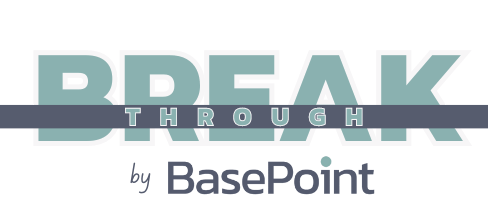Mental Health Disorder Treatment Programs for Young Adults
Mental Health Treatment for Young Adults with Breakthrough by BasePoint
Mental health treatment options are important for young adults who are often balancing challenges in relationships, work, and family. Many of the psychological disorders and behavioral health conditions that affect adults and seniors can also impact young adults. When peer pressure, college challenges, or work responsibilities are overwhelming, you may need more help than a once-a-week therapy session.
What Is a Mental Health Treatment Center?
A mental health treatment center offers therapeutic interventions to individuals experiencing mental health conditions, such as anxiety, depression, eating disorders, substance use disorders, or post-traumatic stress disorder (PTSD). These interventions may be applied in a residential program, intensive outpatient program, or in a virtual setting.
Treatment for mental health conditions should not use a one-size-fits-all approach. Older adolescents and young adults are individuals with unique circumstances that influence mental health conditions. It is crucial to use a customized approach to treatment that elevates the potential for success, improves resilience, and reduces the relapse rate.

What Age Group Are Young Adults?
At Breakthrough by BasePoint, young adults are 18 to 28 years old and out of high school. These are crucial years in an individual’s development and help to establish a foundation for resilience and strong mental health through adulthood. The stressors that young adults experience vary and depend on the individual’s life circumstances.
For example, a 22-year-old college student’s stressors differ from a 25-year-old, newly married, young adult with one child. In all cases, young adults in America are reporting higher levels of stress than older generations have, including financial burdens and isolation. These are compounded by career decisions, planning for the future, and the aftermath of the COVID-19 pandemic.
Mental Health Treatment Admissions and Intake
Our complimentary assessment with a licensed clinician will provide you with a recommendation for the appropriate level of care for young adults struggling with their mental health. We can also check your insurance coverage levels.
Call us today to schedule a complimentary same day assessment at (972) 357-1749 or fill out our inquiry form.
Find Out About Our Admissions
Common Mental Health Disorders Treated for 18-28 Year Olds
Mental health disorders in young adults increase the challenges of dealing with everyday life. Generation Z and the younger millennial generation are in a transitional phase of life that can increase vulnerability. Below is a list of common mental health disorders diagnosed in young adults aged 18 to 28 years, but it is not an exhaustive list.
Online Depression Treatment
Depression is more than just feeling sad. It is a mental health condition that influences the way you think, feel, and act. Different levels of severity of depression can dramatically affect eating, energy, and sleeping patterns, your interest in everyday activities, and feelings of sadness or worthlessness.
Depression is one of the most common mental health conditions and maybe even more severe for young adults than older adults. A survey from the National Institute of Mental Health demonstrates that the prevalence of major depressive episodes in young adults is 18.6%, which is roughly double the prevalence of those aged 26 to 49.
Online Anxiety Disorders (e.g., Generalized Anxiety Disorder, Social Anxiety) Treatment
There is a wide variety of anxiety disorders that are characterized by the object or situation that induces the anxiety. For most young adults, anxiety disorders interfere with job performance, relationships, and school. Anxiety disorders can include panic disorder, general anxiety disorder, specific phobias, social anxiety disorder, post-traumatic stress disorder, separation anxiety disorder, and obsessive-compulsive disorder (OCD).
According to the National Institute of Mental Health, the prevalence of anxiety disorders in young adults remains relatively stable between 18 and 59 years. Anxiety is a common emotion that is crucial to survival. However, when anxiety leads to constant worrying, digestive issues, insomnia, and a reduced ability to function, it becomes a mental health condition.
Online Post-Traumatic Stress Disorder (PTSD) Treatment
Post-traumatic stress disorder (PTSD) is generally triggered by acute or chronic traumatic events such as the loss of a loved one, bullying, chronic abuse, an accident, or witnessing a life-threatening situation. It is normal to need time to get past a traumatic event. However, people with PTSD continue to have flashbacks, dreams, or upsetting thoughts about their experiences.
The symptoms of PTSD can appear immediately but are usually noticed within the first six months after the experience. They can include avoidance of a situation that triggers memories, flashbacks, and nightmares or being always tense and on guard. People with PTSD may also experience other co-occurring mental health conditions, such as anxiety and depression, which may lead to substance use disorders, problems eating and sleeping, or increased anger and irritability.
Online Bipolar Disorder Treatment
It is normal to experience a wide range of motions, but when the ups and downs of life are associated with periods of manic behavior and depressive mood, it may be bipolar disorder. Signs of bipolar disorder in young adults can be challenging to identify as it sometimes presents as other mental health conditions.
It can overlap with symptoms of attention deficit disorder, conduct disorder, and emerging borderline personality disorder in young adults. The symptoms of extreme ups and downs in mood and activity level manifest at a time in life that is usually turbulent. Early diagnosis and treatment are crucial since the condition does not get better on its own and, when left untreated, can lead to devastating results.
Online Attention-Deficit/Hyperactivity Disorder (ADHD) Treatment
Attention deficit hyperactivity disorder (ADHD) is a common neurodevelopmental disorder that typically arises in childhood but lasts through adulthood. There are three types of ADHD. Each has a unique set of symptoms that affect your behavior and ability to follow instructions. In some cases, ADHD may not have been diagnosed in childhood.
Symptoms of attention deficit disorder in young adults can include trouble focusing, lack of organization and poor time management, trouble multitasking, restlessness, and mood swings. These problems can lead to significant challenges in college, social situations, and job performance. Young adults with ADHD can find it difficult to meet deadlines, control emotional outbursts, and be organized to get to events or meetings on time.
Online Trauma Treatment
Some types of events are clearly traumatic, such as a natural disaster, being assaulted, or experiencing a traumatic loss. Other types of situations do not at first appear traumatic, such as public embarrassment, a minor traffic accident, or changing schools. Trauma is experienced during and immediately after a highly distressing event.
During this period, symptoms associated with a traumatic response include being nervous or on edge, difficulty sleeping, panic attacks, flashbacks, depression, and anxiety. These symptoms can last for up to six months. Through early trauma treatment, the board-certified mental health professionals at BasePoint Academy can help limit the negative impact of trauma and reduce the potential that it develops into PTSD.
Online Psychiatric Disorders Treatment
The prevalence of psychiatric disorders in young adults rose in 2021 when 48% reported struggling with mental health, 39% reported using prescription medications and/or receiving counseling, and 36% reported having an unmet counseling need. Identifying and treating psychiatric disorders is crucial for promoting a young adult’s well-being throughout their life.
Young adults continue to experience cognitive development through age 29, which is one reason why they are more vulnerable to mental health conditions. Most people are familiar with the emotional turmoil that accompanies adolescence. The part of the brain that controls impulse control, organization, and planning continues to develop through the mid-20s, accounting for a young adult’s vulnerability.

Does Insurance Cover Online Treatment
for Mental Health?
Yes, health insurance covers online mental health treatment. Their parent’s health insurance policy may still cover young adults aged 18 to 25. In 2010, the Affordable Care Act mandated that all health insurance policies offer coverage for essential healthcare services. This includes mental health conditions and substance use disorders.
However, your rehab insurance coverage is limited by your insurance policy. Some policies limit how mental health treatment can be administered; others may limit the number of sessions allowed per incident, year, or lifetime. The easiest way to identify your policy limits is to call Breakthrough by BasePoint at (972) 357-1749 or contact us online. Our admission specialist will verify your insurance, estimate your out-of-pocket costs, and determine if prior authorization is required before treatment can begin.

Insurance Providers That Cover Online Mental Health Treatment of Young Adults
Health insurance companies are mandated to provide essential health services, including psychological disorders, behavioral health conditions, and mood disorders, as well as substance abuse and addiction. However, each insurance policy has different benefits and limitations to their insurance coverage levels.
The benefits and limitations include your deductible, copays, out-of-pocket costs, and whether the facility is located in-network. Each of these affects the cost of treatment. Insurance providers that cover online health treatment of young adults in Texas include Aetna, Blue Cross Blue Shield, Magellan, UnitedHealthcare, Optum, and Cigna.
Breakthrough by BasePoint Accepts health Insurance
We accept most major health insurance providers in Texas and can check your treatment coverage levels on your behalf
YOUNG ADULT MENTAL HEALTH TREATMENT CENTERS NEAR DALLAS, TEXAS
Breakthrough by BasePoint has several treatment facilities in the Dallas-Fort Worth area, including in Arlington, Forney, and McKinney, Texas. Each of these luxury facilities offers the same level of care from licensed mental health professionals whose focus is providing teenagers with the tools and resources they need to heal and support sustainable recovery from depression and other mental health conditions.
- Arlington, Texas: 3900 Arlington Highlands Blvd, Suite 237, Arlington, TX 76018
- Forney, Texas: 713 W Broad St, Suite 200, Forney, TX 75126
- McKinney, Texas: 4733 Medical Center Drive, McKinney, TX 75069

Contact BreakThrough by BasePoint Today
Contact us today to schedule a free confidential assessment with a licensed clinician.
You can also get in touch to talk with our mental health experts about treatment needs, care options and your insurance coverage levels.
Call: (972) 357-1749Check Your InsuranceSigns and Symptoms of Mental Health Disorders in Over 18’s
The signs and symptoms of mental health disorders in college students and early adulthood can be exhibited slightly differently than in childhood and adolescence, or older adults. Below are some of the symptoms that can occur in a variety of conditions and how they may exhibit in the life of emerging adults. Although these are common symptoms, this is not an exhaustive list.
- Mood changes: Young adults may experience prolonged feelings of hopelessness or helplessness, ongoing sadness or empty mood, or excessive guilt. Mood changes include extreme mood swings from being ecstatic and happy to sad or depressed. You may be more irritable and get angry more easily.
- Changes in sleep patterns: Symptoms of a mental health condition can affect how you sleep, including being unable to go to sleep, falling asleep but waking up throughout the night, or sleeping excessively through the day and night.
- Changes in appetite and weight: Symptoms of a mental health condition are often accompanied by changes in appetite, which are reflected by changes in your weight. It may be associated with an underlying medical condition if you are gaining or losing weight without eating more or less.
- Disordered eating habits: While mental health conditions can affect your appetite level, they can also affect how you approach food. Disordered eating habits can include binge eating, anorexia, and bulimia. These symptoms are not driven by physical appetite but rather are symptoms of an eating disorder.
- Social withdrawal: When experiencing symptoms of a mental health condition, it may feel easier to isolate yourself from friends and family and avoid social activities. Young adults who are experiencing social phobias may also withdraw from activities that cause them increased stress and anxiety.
- Fatigue and low energy: Mental health conditions that trigger a depressed mood increase feelings of fatigue and make it difficult to complete daily tasks. You may feel persistently tired and unable to regain your normal energy level, even when you sleep enough hours at night.
- Difficulty concentrating: Mental health conditions can make it difficult to focus on a specific task, such as work or school, reducing your performance. You may also find yourself becoming more forgetful.
- Loss of interest: Activities that were once exciting and interesting to you no longer hold meaning in your life. You feel apathetic or indifferent to most of what happens throughout the day. Your friends and family may have noticed your loss of interest.
- Increased anxiety: You may experience excessive worry and fear, panic attacks, or develop new fears of situations and or people.
- Increased risky behaviors: It may feel as if you’ve lost your normal level of concern for situations and places, leading you to act recklessly. You may make impulsive decisions and put yourself in situations that increase the risk of getting sick or injured.
- Relationship problems: Mental health conditions can make it challenging to maintain a healthy relationship with family, friends, or partners. You may experience frequent conflicts and arguments that damage the relationship.
- Somatic and physical symptoms: You may experience unexplained physical aches and pains without an injury or illness. If you develop excessive thoughts, feelings, or behaviors related to these symptoms, they become somatic symptoms.
- Self-harm: Self-harm activities include cutting, burning, or picking at wounds. People engage in self-harm activities to feel pain when they are emotionally numb, punish themselves, or avoid or manage their feelings.
- Suicidal thoughts: These can occur in several mental health conditions and can occur outside of a mental health diagnosis. Left untreated, it can have devastating results for the individual and their family.
- Substance abuse: Mental health conditions can trigger an increased use of alcohol, drugs, or other substances that alter your mental, emotional, and physical state.
What Are The Causes of Mental Health Problems in Young Adults?
There isn’t one cause for mental health problems in young adults. It’s likely that for many people, it’s a combination of complicated factors that affect mental health symptoms. The following are just some of the identified causes that can trigger mental health problems, but it is not an exhaustive list.
- Early life experiences: Experiences during childhood can have a significant and lifelong impact on your mental health. These include abuse, trauma, neglect, long-term physical health conditions, domestic violence, or being a witness to a traumatic event.
- Chemical imbalances: The human brain is extremely complicated, and some research suggests that brain chemistry may influence mental health problems. There is evidence that medication is effective in treating some symptoms, but they do not work the same for everyone.
- Trauma and stress: Severe emotional stress or experiencing a traumatic event such as sexual abuse, loss of a loved one, or witnessing a life-altering event can significantly influence mental health.
- Genetics: Some mental health conditions are more commonly found in people who have blood relatives with the same illness. While genetics can increase the risk, other factors must also be present to trigger most mental health conditions.
- Family and peer influences: Everyone can experience a traumatic event, but not everyone who experiences a traumatic event develops a mental health condition. Family and peer influences can help protect you or can increase your potential risk for developing a mental health condition, such as depression, anxiety, or an eating disorder.
- Coping mechanisms: People with strong coping mechanisms and a network of supportive friends and family have a reduced risk of experiencing mental health conditions.
Levels of Care for Young Adult Mental Health Treatment
Partial Hospitalization Program:
The PHP at Breakthrough by Basepoint provides a highly structured environment for young adults aged 18-28 who are facing mental health challenges. This intensive program includes individual therapy, group therapy, and medication management, all tailored to the specific needs of each participant. Our dedicated team of professionals work closely with participants, fostering self-awareness, resilience, and the development of healthy coping mechanisms.
Intensive Outpatient Program:
Our IOP offers a flexible yet comprehensive approach to mental health treatment, ideal for those transitioning from the PHP or those requiring a level of care more intensive than traditional outpatient therapy. Participants in this program receive therapeutic support through group sessions, individual counseling, and psychiatric consultations, while maintaining their daily routines. At Breakthrough by Basepoint, we are committed to providing the tools and skills necessary for young adults to navigate life’s challenges and achieve improved mental well-being.

Does Mental Health Treatment Include Therapy and Counseling?
Mental health treatment includes therapy and counseling, whether you receive that in person or virtually. Therapy and counseling occur in one-on-one situations, in groups, and with your family. This is the foundation of learning coping mechanisms and other strategies that reduce the symptoms of mental health conditions.
The type of talk therapy you experience at Breakthrough by BasePoint is customized to meet your needs based on your psychological examination. Therapy and counseling can help to strengthen your self-confidence, build relationship skills, and help change the behaviors that have held you back from success.
How Much Does Online Mental Health Treatment Cost?
The cost of online mental health treatment varies greatly depending on your customized treatment plan, the facility, and insurance coverage. Virtual therapy services without insurance can cost from $80 to $150 per session. The number of sessions you receive each week influences your weekly cost.
Although the Affordable Care Act mandates that all health insurance plans must cover mental health treatment, all plans have specific limitations, and not all plans cover virtual treatment. Some plans limit the type of therapy you can receive, while others limit the number of sessions per incident, year, or lifetime. You can easily check your insurance coverage by calling Breakthrough by BasePoint and speaking to one of our admission specialists.
Young Adult Treatment Program Admissions Process
Mental disorders in young adults are challenging, but you can receive help in a safe and structured environment at Breakthrough by BasePoint. When you call Breakthrough by BasePoint at (972) 357-1749, the admission specialist can schedule a complimentary, same-day evaluation from a licensed clinician to determine the appropriate level of care to treat your condition.
After the free evaluation and insurance verification, you will undergo a more intensive psychological evaluation, from which our board-certified mental health professionals customize a treatment program to meet your needs. You can begin online treatment as soon as the following day. The mental health professionals evaluate your progress throughout the program and may modify the treatment plan.
Young Adult Mental Health Treatment Process and Schedule
On the first day of the young adult mental health treatment program, you will see a psychiatrist. Nearly everyone is involved in individual one-on-one therapy, which offers you the ability to discuss life’s challenges in a safe and supportive environment. Throughout individual therapy, licensed clinicians use multiple evidence-based treatment strategies to help you learn to live life on your terms.
Daily Schedule
Both our PHP and IOP for young adults start each day at 9am with treatment programs lasting until 1:30pm. We will begin each day with a mindfulness session to help ensure that each patient is prepared for a successful day of treatment. Following our mindfullness hour, we will move into our group sessions. There will be weekly family sessions and individual therapy is also available as prescribed. Continue reading for more details about the various online therapies offered.Group Therapy
Group therapy treatment programs offer a form of counseling that’s been highly effective in children, adolescents, young adults, and adults. Over time, you develop new skills and habits by participating in an interpersonal group process. Group therapy provides a safe space to address behavioral health concerns and get support from your peers.Family Therapy
Family therapy sessions are an important part of recovery. At BasePoint Academy, we believe the family deserves a safe space to work through challenges that have occurred and to develop strategies that prevent them from reoccurring. Family sessions help when there has been a struggle with grief, disruptive behavior, relationship problems, and self-esteem issues.Cognitive Behavioral Therapy and Dialectical Behavioral Therapy
Cognitive behavioral therapy and dialectical behavioral therapy are two types of behavioral therapies that address a broad spectrum of behaviors using evidence-based techniques in a holistic approach. Cognitive behavior therapy is a form of talk therapy that focuses on identifying negative mental patterns and the behaviors that follow. It helps improve awareness and connection between thought and action. Dialectical behavior therapy is another form of talk therapy that helps individuals understand opposite ideas and equips them to live within realistic parameters.- Online mental health can help reduce mental health stigma, may help those with limited mobility, and is compatible with public health guidelines during highly infectious seasons.
- A national poll revealed most people have welcomed telehealth expansion. The number using telehealth services rose 7% from 2020 to 2021 and nearly 60% said they would use telehealth for mental health care.
- Respondents were more likely to say that mental health telehealth offers the same quality and younger adults were more likely to use it than older adults.
- A study by Verywell Mind showed that 91% of people in online mental health therapy said that more people should try it.
- Portland State University found those receiving mental health treatment online scored higher in the Global Assessment of Functioning and Client Satisfaction Scales.
- According to the National Council for Behavioral Health, more than 50% of Americans found mental health too hard to get or too expensive. Teletherapy helps eliminate some of those barriers.
- Online therapy allows you to receive mental health in the privacy of your home and access providers on a flexible schedule. However, therapy sessions can be impacted by unstable internet connections and may not be comfortable for people who need help with in-person communication skills.

Effectively Treat Young Adult Mental Health Disorder With Breakthrough by BasePoint
With expert care and a safe environment, we can help you address and overcome mental health concerns. Call today to discover the treatment for long-term healing.








